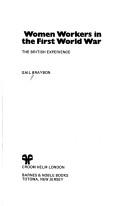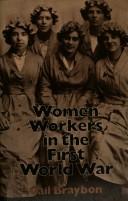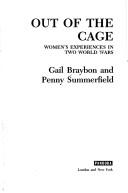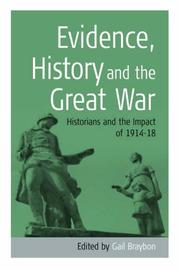| Listing 1 - 10 of 10 |
Sort by
|

ISBN: 1571818014 1571817247 178238183X 132217024X Year: 2005 Publisher: New York, N.Y. Berghahn
Abstract | Keywords | Export | Availability | Bookmark
 Loading...
Loading...Choose an application
- Reference Manager
- EndNote
- RefWorks (Direct export to RefWorks)
In the English-speaking world the Great War maintains a tenacious grip on the public imagination, and also continues to draw historians to an event which has been interpreted variously as a symbol of modernity, the midwife to the twentieth century and an agent of social change. Although much ''common knowledge'' about the war and its aftermath has included myth, simplification and generalisation, this has often been accepted uncritically by popular and academic writers alike. While Britain may have suffered a surfeit of war books, many telling much the same story, there is far less written a
History of Europe --- History as a science --- anno 1910-1919 --- anno 1930-1939 --- anno 1940-1949 --- anno 1920-1929 --- Guerre et société --- #SBIB:041.AANKOOP --- #SBIB:93H3 --- Thematische geschiedenis --- World War, 1914-1918 --- War and society. --- Première guerre mondiale --- Guerre et société --- Historiography. --- Women. --- Medical care. --- Social aspects. --- Historiographie --- Femmes --- Soins médicaux --- Aspect social --- European War, 1914-1918 --- First World War, 1914-1918 --- Great War, 1914-1918 --- World War 1, 1914-1918 --- World War I, 1914-1918 --- World War One, 1914-1918 --- WW I (World War, 1914-1918) --- WWI (World War, 1914-1918) --- History, Modern --- Society and war --- War --- Sociology --- Civilians in war --- Sociology, Military --- Social aspects

ISBN: 0389201006 9780389201007 Year: 1981 Publisher: London: Croom Helm,
Abstract | Keywords | Export | Availability | Bookmark
 Loading...
Loading...Choose an application
- Reference Manager
- EndNote
- RefWorks (Direct export to RefWorks)
Women --- Public opinion --- World War, 1914-1918
Book
ISBN: 070990603X Year: 1981 Publisher: London Croom Helm
Abstract | Keywords | Export | Availability | Bookmark
 Loading...
Loading...Choose an application
- Reference Manager
- EndNote
- RefWorks (Direct export to RefWorks)
History of the United Kingdom and Ireland --- anno 1910-1919

ISBN: 0415042011 Year: 1989 Publisher: London New York Routledge
Abstract | Keywords | Export | Availability | Bookmark
 Loading...
Loading...Choose an application
- Reference Manager
- EndNote
- RefWorks (Direct export to RefWorks)
Book
ISBN: 1136248668 0203104218 1283895439 1136248676 Year: 2013 Publisher: London ; New York : Routledge,
Abstract | Keywords | Export | Availability | Bookmark
 Loading...
Loading...Choose an application
- Reference Manager
- EndNote
- RefWorks (Direct export to RefWorks)
Commentators writing soon after the outbreak of the First World War about the classic problems of women's employment (low pay, lack of career structure, exclusion from ""men's jobs"") frequently went on to say that the war had ""changed all this"", and that women's position would never be the same again.This book looks at how and why women were employed, and in what ways society's attitudes towards women workers did or did not change during the war. Contrary to the mythology of the war, which portrayed women as popular workers, rewarded with the vote for their splendid work, the auth
Women --- Public opinion --- World War, 1914-1918 --- Employment --- History --- Women. --- Influence.
Book
ISBN: 9780415752459 Year: 2014 Publisher: London : Routledge,
Abstract | Keywords | Export | Availability | Bookmark
 Loading...
Loading...Choose an application
- Reference Manager
- EndNote
- RefWorks (Direct export to RefWorks)
Women employees --- Women --- Women. --- World War, 1914-1918 --- World War, 1939-1945 --- Attitudes --- Attitudes. --- Employment --- History --- Employment. --- 1900-1999. --- Great Britain.

Abstract | Keywords | Export | Availability | Bookmark
 Loading...
Loading...Choose an application
- Reference Manager
- EndNote
- RefWorks (Direct export to RefWorks)
De auteurs baseren zich op dagboeken, memoires, brieven en opgenomen interviews van Britse vrouwen, waarin zij getuigen over hun werkervaringen tijdens beide wereldoorlogen. De Eerste Wereldoorlog gaf aan vele vrouwen aanvankelijk een gevoel van vrijheid en optimisme doordat ze zich nuttig konden maken voor hun land. Dat stond echter in schril contrast met de daaropvolgende bitterheid toen zij na 1918 hun jobs in de fabrieken weer moesten afstaan aan mannen. Het was “like being let out of a cage”, zoals de titel van het boek zegt. Reeds bij de mobilisatie in 1914 was er verzet tegen de massale intrede van vrouwen in de fabrieken. Onervaren werkkrachten moesten nu het werk van specialisten leren en heel wat mannelijke ingenieurs weigerden hen machines te laten bedienen en ingewikkelde productieprocessen te laten beheren. De Britse overheid moest ingrijpen en sloot daartoe akkoorden met de vakbonden, waarin bepaalde garanties werden afgedwongen, veelal in het nadeel van de vrouw. Diezelfde overheid bleek ook weinig aandacht te hebben voor de combinatie arbeid-gezin. Hoe vrouwen met zulke tegenwerkingen en hinderpalen omgingen, is de focus van dit boek.
Sociology of the family. Sociology of sexuality --- History --- Book --- First World War --- anno 1910-1919 --- anno 1940-1949 --- Great Britain
Book
ISBN: 1136247335 0203103963 1299279171 1136247343 Year: 2013 Publisher: London ; New York : Routledge,
Abstract | Keywords | Export | Availability | Bookmark
 Loading...
Loading...Choose an application
- Reference Manager
- EndNote
- RefWorks (Direct export to RefWorks)
Originally published in 1987, Out of the Cage brings vividly to life the experiences of working women from all social groups in the two World Wars.Telling a fascinating story, the authors emphasise what the women themselves have had to say, in diaries, memoirs, letters and recorded interviews about the call up, their personal reactions to war, their feelings about pay and the company at work, the effects of war on their health, their relations with men and their home lives; they speak too about how demobilisation affected them, and how they spent the years between two World
Women --- World War, 1914-1918 --- World War, 1939-1945 --- Employment --- History --- Social conditions.


ISBN: 9781782381839 178238183X 1571817247 9781571817242 1571818014 9781571818010 Year: 2003 Publisher: New York Oxford
Abstract | Keywords | Export | Availability | Bookmark
 Loading...
Loading...Choose an application
- Reference Manager
- EndNote
- RefWorks (Direct export to RefWorks)
Multi

ISBN: 9781782381839 Year: 2003 Publisher: New York; ; Oxford Berghahn Books
Abstract | Keywords | Export | Availability | Bookmark
 Loading...
Loading...Choose an application
- Reference Manager
- EndNote
- RefWorks (Direct export to RefWorks)
| Listing 1 - 10 of 10 |
Sort by
|

 Search
Search Feedback
Feedback About UniCat
About UniCat  Help
Help News
News